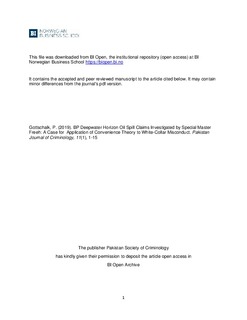BP Deepwater Horizon Oil Spill Claim Investigated by Special Master Freeh: A Case for Application of Convenience Theory to White-Collar Misconduct
Journal article, Peer reviewed
Accepted version
Permanent lenke
http://hdl.handle.net/11250/2607610Utgivelsesdato
2019Metadata
Vis full innførselSamlinger
- Publikasjoner fra CRIStin - BI [1015]
- Scientific articles [2181]
Originalversjon
Pakistan Journal of Criminology. 2019, 11 (1), 1-15.Sammendrag
After an oil spill in the Gulf, British Petroleum had to compensate victims of the
accident. The total compensation was $11 billion. As suggested by the theory of
convenience, a financial motive, an organizational opportunity and a personal
willingness can explain deviant behavior by members of the elite in society to gain
from the compensation program. In the case of the BP Deepwater Horizon
settlements, attorneys were both presenting claims on behalf of victims as well as
approving claims on behalf of petroleum company BP. It was a profitable assignment
for attorneys, and some attorneys made it even more profitable for themselves by
kickbacks and by both applying for and approving compensations. As illustrated in
this case study, a report of investigation can serve as an empirical basis for the study
of convenience theory.
